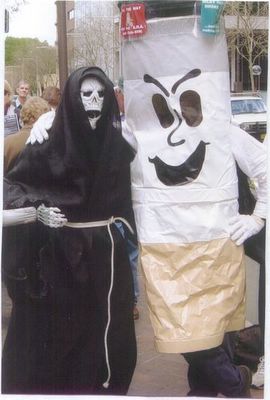Once More Into the Frey, Dear FriendsToday's New York Times has a
short account of the explanation/apology that James Frey has released as an explanatory note to be included in future copies of his Million Man Lies book, apparently the text that he and his Nanny were working on over her tuna salad (the WSJ doesn't say what he ate, if anything) in the meeting described in the Wall Street Journal article, see directly earlier post. Frey's statement is
posted as a PDF file on the Random House site.
Frey indicates that he is genuinely unsure of the tooth-pulling incident, and says his doctors at the Hazelden clinic think his memory is flawed. (However, several treatment professionals formerly employed there are
on record saying that the majority of Frey's book, about his treatment, is false.) There is something of the insanity defense in this, but it may well be true.
He also writes that he had no idea his book would be this popular, and he's felt overwhelmed at times, which also rings true. So possible factors begin to emerge: his purchase on the truth is flawed by the effects of the addiction he writes about, and he probably persuaded himself that a few "embellishments" wouldn't matter in a book that might sell a few thousand copies to a particular market.
I also feel it's churlish to continue writing about a book I have not read, and as no one is paying me to go through that travail, a book I don't intend to read. But I can comment on the statement, which I have read.
Frey says some of his embellishments had a structural purpose, to make a better narrative. But he offers another reason, summarized by the Times:
Overall, his self-portrayal in "A Million Little Pieces," is "a combination of facts about my life and certain embellishments," about a person who "I created in my mind to help me cope" with drug addiction and recovery. He said most of the invented material "portrayed me in ways that made me tougher and more daring and more aggressive than in reality I was, or I am."The events and details were invented, he said, "in order to serve what I felt was the greater purpose of the book," specifically to "detail the fight addicts and alcoholics experience in their minds and in their bodies, and detail why that fight is difficult to win." This suggests that some of these "embellishments" were part of the pathology of drug addiction and the tools he employed in coping and recovery. In literary terms, he is describing a function and a strategy known as the "unreliable narrator." It is a technique rich in possibilities. The problem is that it works when the author uses it consciously, and the work is fiction.
It's true that some of the earliest novels were counterfeit journals of voyages, sermons and cautionary tales about the sins of people who didn't actually exist. But these quickly became conscious literary devices, and there were always clues to the "deception." There come to be clues as to what is outside the narrator's head and what's only inside it, or clues that it's all in his head, or that you can't trust any of it to be objectively true.
But in Frey's case, he was selling these melodramatic lies as true, without irony. He suggests he wasn't in total control of this material, representing what may have gone on only in his mind as things which happened in the outer world. He describes a pathology, not a legitimate writing approach. But let's skip to the final paragraph of his statement, where he justifies this.
There is much debate now about the respective natures of works of memoir,
nonfiction, and fiction. That debate will likely continue for some
time. I believe, and I understand others strongly disagree, that memoir allows
the writer to work from memory instead of from a strict journalistic
or historical standard. It is about impression and feeling, about individual
recollection. This memoir is a combination of facts about my life and certain
embellishments. It is a subjective truth, altered by the mind of a recovering
drug addict and alcoholic. Ultimately, it’s a story, and one that I
could not have written without having lived the life I’ve lived.The key here is the assertion that memoirs are about memory, and it's categorically inappropriate to hold them to a "strict journalistic or historical standard." The problem is that in books, readers expect to know what is the writer's fantasy and what actually happened in the shared world. Many of Frey's "embellishments" involve other people, including a tragic death that affected families and their friends. It's interesting in a literary sense for an author to inject himself into those events even when he wasn't actually part of them, because he feels so strongly about them. But it is dishonest to assert this fantasy was true, and in effect it exploits those events.
In his statement Frey says he'd been writing movies in Hollywood when he started this book. No one expects a Hollywood biography or historical story to be anything more than loosely true. Most moviegoers understand that liberties will be taken for dramatic effect (usually the creation of subsidiary characters or combining several into one, collapsing time, leaving out messy details and contradictions to the arc of the story, etc.) but these days there is usually some textual indication--after the show, buried in the credits, etc.--of the extent of the changes. This Hollywood standard however has not been the standard for books. At least not until now.
I don't think anyone is calling for a "strict" journalistic standard---Frey would be forgiven for saying he was in jail for a year if it turned out it was 10 months (it was a few hours.) But by his own admission Frey asserted things happened in the shared world that happened only in his mind, however addled. That's inflicting delusion on readers with the assertion it is public fact.
What Frey suggests could make a fascinating book---this interplay of fantasy and objectively verifiable, with expressionistic interpolations into shared reality as a reflection of the inner world of an addict, coping and recovering. But apparently that's not the book that was published.
Frey may defend his imposing fantasies, exploiting both people he wrote about and the reader, but he also suggests his own perceptions are flawed. In any case, the real fault here is with his editor and publisher. His editor should have questioned the more extreme events and coincidences, and worked with him to craft a book that presented these fantasies in context. If Frey could not be objective about this, his editor had the responsibility to be. And to either help him make the necessary changes to craft what quite possibly could have been a better book, or to decline to publish deluded recollections as true, along with conscious fabrications beyond the accepted boundaries for nonfiction.
What I still don't understand is how the first deception to be discovered---Frey's jail time, which was actually hours and not months---can be considered an "embellishment." From descrptions I've read, other important events, as well as his entire next book, follow from this phantom incarceration. What's up with that?
Finally, that there is a controversy shows at least a residual concern for truthfulness, as opposed to the assertion and appearance of truth, as I gather is meant by the current buzzword, "truthiness." We are so used to politicans and journalists repeating utter falsehoods until they become the conventional shared truth, that it's surprising anybody cares to make the distinctions. Of course those distinctions are vital. If Al Gore bragged that he invented the Internet, then his veracity is not to be trusted. (In fact he did not claim this. He rightly claimed a hand in certain legislation that enabled it.) If other administrations did what Bush is doing in his domestic spying, as he asserts, then how can he be faulted, let alone impeached? (It's a lie, but it takes some explaining, which makes lying alot easier in impatient times.)
People believe so many objectively crazy things, so many obvious projections of their fears and frustrations, that the existence of any standard of shared truth beyond the scores of major sporting events (perhaps the last bastion of shared truth) is nearly miraculous.
In his statement Frey makes a point of saying how much he wanted to be the author of books. I certainly empathize with the anxiety and finally the desperation to be published---the idea that it justifies and transforms your life, as it transformed Frey's. And I understand the frustration and the deep anger with editors, agents and publishing that it quite clear in other accounts of Frey's attempts to be published, and is especially a feature of the writer who passed himself off as a Navajo named Nasdijj, in an earlier if lesser known publishing scandal.
I have my own grievances against editors, agents and publishers, which I have written about openly (for instance, in my account of the making of
The Malling of America, added to the paperback edition.) I had hoped for a career as an author but like a minor league baseball player who gets a "cup of coffee" and a few innings with a major league club, it didn't happen, and along with related dreams that were thereby dashed, it added up to what I can best describe as a broken heart.
So I feel a certain awe for those who exploited the system's hypocrisies and greed, as well as engaging in other manipulations of a corrupt and simplistic system. (The Nasdijj author was once involved in a gallery show of gay images that wasn't drawing crowds, so he wrote a letter to the editor under a false name attacking it with enraged gaybashing language, and had a friend draft an offended and righteous response. Like clockwork, political groups took up the cause and the show became a hit.) But apart from whether I'm up to carrying off that kind of deception, as well as the question of whether I could write a conscious exploitation if I tried, I can't in the end support such travesties of what I believe in as a central commitment of my life.
So it is easy enough to say this is sour grapes, and my own relative poverty is the best argument for jettisoning these quaint standards. Believe me, I've heard that before. But so what? I've stated my case, and you can believe what you want. I've had my say. The whole damn world can read it and no publisher can prevent it. Apart from competition from a few hundred million other sources, it's as good as published by Random House.












